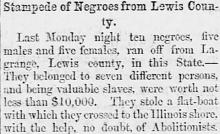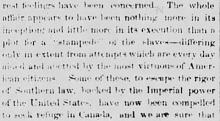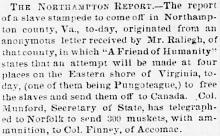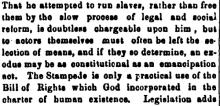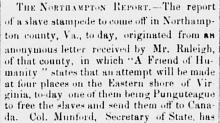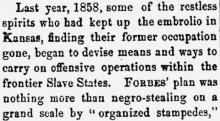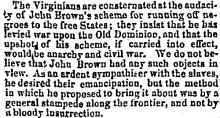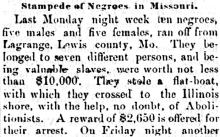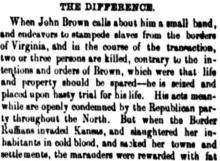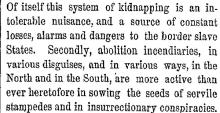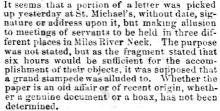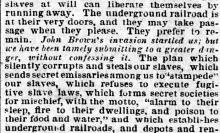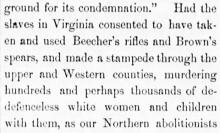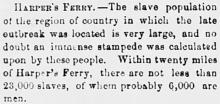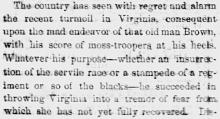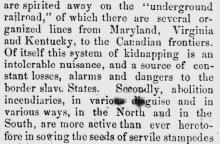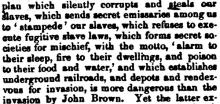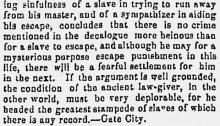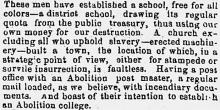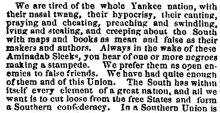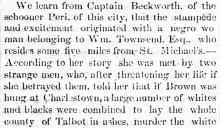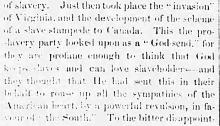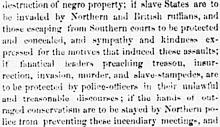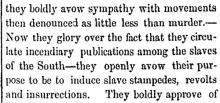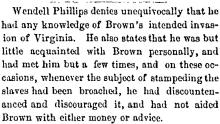View All Documents // 1840s // 1850s // 1860s
Displaying 701 - 734 of 734
Stampedes of slaves in parties of a dozen or two are becoming frequent. The last troop of twelve or fifteen escaped from Alexandria, Va., about the time of the Harper’s Ferry tumult, and passed the Niagara the following week.
Stampede of Negroes from Lewis County.
Last Monday night ten negroes, five males and five females, ran off from Lagrange, Lewis county, in this State.––They belonged to seven different persons, and being valuable slaves, were worth not less than $10,000. They stole a flat-boat with which they crossed to the Illinois shore, with the help, no doubt, of Abolitionists. A reward of $2,650 is offered for their arrest. On Friday night another negro belonging to Capt. Lillard, of the same place, effected his escape, making eleven in all.––St. Louis News.
Excitement on the Eastern Shore of Virginia Anticipated––Stampede of Slaves.
NORFOLK, NOV, 23.––A special messenger has arrived here from Northampton on the Eastern Shore of Virginia, for volunteers to protect the property of slave owners, it having been ascertained that an attempt would be made on the 25th to run off slaves to Canada. Great excitement is said to prevail in the vicinity in reference to the matter.
The Slave Insurrection and Its Hero
…The whole affair appears to have been nothing more in its inception and little more in its execution than a plot for a “stampede” of the slaves––differing only in extent from attempts which are every day aided and abetted by the most virtuous of American citizens. Some of these, to escape the rigor of Southern law, backed by the Imperial power of the United States, have now been compelled to seek refuge in Canada….
[Editor's Note: The majority of this article has been omitted from our transcription except for the portions directly the term "slave stampedes" or some variant.]
THE NORTHAMPTON REPORT.–– The report of a slave stampede to come off in Northampton county, Va., to-day, originated from an anonymous letter received by Mr. Raleigh, of that county, in which “A Friend of Humanity” states that an attempt will be made at four places on the Eastern shore of Virginia, to-day, (one of them being Pungoteague,) to free the slaves and send them off to Canada. Col. Mumford, Secretary of State, has telegraphed to Norfolk to send 300 muskets, with ammunition, to Col. Finney, of Accomac.
…That he attempted to run slaves, rather than free them by the slow processes of legal and social reform, is doubtless chargeable upon him, but to actors themselves must often be left the selection of means, and if they so determine, an exodus may be as constitutional as an emancipation act. The Stampede is only a practical use of the Bill of Rights which God incorporated in the charter of human existence….
[Editor's Note: The majority of this article has been omitted from our transcription except for the portions directly the term "slave stampedes" or some variant.]
THE NORTHAMPTON REPORT.–– The report of a slave stampede to come off in Northampton county, Va., to-day, originated from an anonymous letter received by Mr. Raleigh, of that county, in which “A Friend of Humanity” states that an attempt will be made at four places on the Eastern shore of Virginia, to-day, (one of them being Pungoteague,) to free the slaves and send them off to Canada. Col. Mumford, Secretary of State, has telegraphed to Norfolk to send 300 muskets, with ammunition, to Col. Finney, of Accomac.
Prentice on Seward
…Last year, 1858, some of the restless spirits who had kept up the embrolio in Kansas, finding their former occupation gone, began to devise means and ways to carry on offensive operations within the frontier Slave States. FORBES’ plan was nothing more than negro-stealing on a grand scale by “organized stampedes"....
A LARGE NEGRO STAMPEDE.–– The Chicago Journal says that on Thursday evening, the 17th inst., the underground railroad arrived there with thirty passengers, five from the vicinity of Richmond, Va., twelve from Kentucky and thirteen from Missouri.––They are now all safe in Canada. The thirteen from Missouri were sold to go down the river, the very day they started. A stalwart six footer and a Sharp's rifle were the only guides.
The telegraphic dispatch from Norfolk, announcing a slave insurrection or stampede on the Eastern shore of Virginia, and a consequent excitement there, was based on a very slender foundation.––An anonymous letter was its only foundation, and the alarm, the Norfolk Herald says, excited only a general sentiment of derision.
Who Pointed the Way to John Brown?
...The Virginians are consternated at the audacity of John Brown’s scheme for running off negroes to the free States; they insist that he has levied war upon the Old Dominion, and that the upshots of his scheme, if carried into effect, would be anarchy and civil war. We do not believe that John Brown had any such objects in view. As an ardent sympathizer with the slaves, he desired their emancipation, but the method in which he proposed to bring it about was by a general stampede along the frontier, and not by a bloody insurrection….
[Editors Note: The majority of this article has been omitted from our transcription except for the portions directly mentioning the term "slave stampedes" or some variant.]
The St. Louis papers report a stampede of ten slaves from Lagrange, Mo., on the 21st November. They succeeded in reaching Illinois.
ATTEMPTED STAMPEDE.––The Cambridge Democrat, of yesterday, says:
There were six negroes lodged in jail last Monday, five belonging to Capt. T.H. Webb and one to James Waddell, Esq. They were detected in making an attempt to run away.
Stampede of Negroes in Missouri.
Last Monday night ten negroes, five males and five females, ran off from Lagrange, Lewis county, in this State.––They belonged to seven different persons, and being valuable slaves, were worth not less than $10,000. They stole a flat-boat with which they crossed to the Illinois shore, with the help, no doubt, of Abolitionists. A reward of $2,650 is offered for their arrest. On Friday night another negro belonging to Capt. Lillard, of the same place, effected his escape, making eleven in all.
THE DIFFERENCE.
When John Brown calls about him a small band, and endeavors to stampede slaves from the borders of Virginia, and in the course of the transaction, two or three persons are killed, contrary to the intentions and orders of Brown, which were that life and property should be spared––he is seized and placed upon hasty trial for his life. His acts meanwhile are openly condemned by the Republican party throughout the North. But when the Border Ruffians invaded Kansas, and slaughtered her inhabitants in cold blood, and sacked her towns and settlements, the marauders were rewarded with fat appointments, and became pets of the Federal Government. What we have stated are historical facts. A number of instances are enumerated by the Albany Evening Journal, which attests what we have said:
The South and Southern Safety––A New Presidential Programme.
We are informed from Washington that the failure of the South to secure a law at this session of Congress for the better protection and security of Southern institutions and Southern society will not be considered as the direct signal for disunion, but that still another effort will be made to secure the South, within the Union, against the abolition incendiaries and movements of the North. This effort, it is predicted, will be something in the shape of a Presidential ticket or platform, or both, from a caucus or convention of Southern members of Congress, the authorized and legally constituted representatives of the Southern people.
A PANIC IN TALBOT COUNTY, MARYLAND.––A letter from a reliable source in Talbot (says the Baltimore Exchange) thus explains the excitement said to exist in that county: "There will be, I apprehend, some rumors reaching you of an unpleasant excitement here, but I hope that neither currency nor credit will be given to such. It seems that a portion of a letter was picked up yesterday at St. Michael's, without date, signature or address upon it, but making allusion to meetings of servants to be held in three different places in Miles River Neck. The purpose was not stated, but as the fragment stated that six hours would be sufficient for the accomplishment of their objects, it was supposed that a grand stampede was alluded to. Whether the paper is an old affair or of recent origin, whether a genuine document or a hoax, has not been determined.
MESSAGE OF THE
GOVERNOR OF VIRGINIA,
RICHMOND, DECEMBER 5, 1859.
The Post Master at Emerson, writing to us on business, adds the following postscript:
"The next man that comes along and enquires for Emerson, tell him that it is in the North-west corner of Marion county, Mo. A gentleman told me a short time since that he enquired two days in your city before he could fin a man that could tell him where Emerson was.
"A day or two since a lot of negroes in this neighborhood were making preparations for a general stampede, but the scheme was detected before they got off, and their plans defeated."
Beecher on Practicability.
The Independent, in some comments on John Brown's movements at Harper's Ferry, observes:
"If we carefully analyze the action in the light of the hero's character and motive, we shall find that the criminal loses itself, in the erratic; that the sheer impracticability of the scheme is the real ground for its condemnation."
HARPER'S FERRY.––The slave population of the region of country in which the late outbreak was located is very large, and no doubt an immense stampede was calculated upon by these people. Within twenty miles of Harper's Ferry, there are not less than 23,000 slaves, of whom probably 6,000 are men.
Ten negroes, valued at $10,000, escaped from Lagrange, Mo., into Illinois, on the 14th ult.
NO DISUNION.
We propose to show that the fire-eaters in Congress, who are now dinning the ears of peaceable Northern men with their threats of Disunion, are under bonds to keep under the guns of the Federal power, and that they dare not, if they could, rupture the tie which binds them to the North. We mean what we say––"dare not."
The South and Southern Safety––A New Presidential Programme.
We are informed from Washington that the failure of the South to secure a law at this session of Congress for the better protection and security of Southern institutions and Southern society will not be considered as the direct signal for disunion, but that still another effort will be made to secure the South, within the Union, against the abolition incendiaries and movements of the North. This effort, it is predicted, will be something in the shape of a Presidential ticket or platform, or both, from a caucus or convention of Southern members of Congress, the authorized and legally constituted representatives of the Southern people.
WHAT GOV. WISE THINKS OF THE LOYALTY OF THE SLAVES.
There is no consistency in the advocates of Slavery upon this point. At one time they will sing the halcyon peace and good will which reigns between master and slave, and almost defy the Abolitionists to seduce the negroes from their happy homes. Gov. Wise and the whole Southern press have dwelt with much unction upon the facts, that the slaves refused to join John Brown, and that the first Virginia martyr was a free negro fleeing from the Abolitionists. But immediately they turn about and speak of the imminent danger of insurrection, with all its train of horrors. In his recent message to the Legislature, Gov. Wise says:
A Poor Show for Moses
….If the argument is well grounded, the condition of the ancient law-giver, int he other world, must be very deplorable, for he headed the greatest stampede of slaves of which there is any record.––Gate City.
[Editors Note: The majority of this article has been omitted from our transcription except for the portions directly mentioning the term "slave stampedes" or some variant.]
NEGRO STAMPEDE.––The Chicago Journal says that on Thursday, the 17th inst., the Under-ground Railroad arrived there with thirty passengers, five from the vicinity of Richmond, Va., twelve from Kentucky and thirteen from Missouri. They are now all safe in Canada. The thirteen in Missouri were sold to go down the river the very day they started. A stalwart six-footer and a Sharpe's rifle were the only guides.
The Abolitionists to be Expelled.
The citizens of Madison county met on Saturday, and resolved that John G. Fee and his brother Abolitionists in that county should be driven from it. They recite these as good reasons why their presence is unsafe in a community where slaves are held:
The Entire Animal of Nothing
...We are tired of the whole Yankee nation, with their nasal twang, their hypocrisy, their canting, praying and cheating, preaching and swindling, lying and stealing, and creeping about the South with maps and books as men and false as their makers and authors. Always in the wake of these Aminadab Sleeks, you hear of one or more negroes making a stampede. We prefer them as open enemies to false friends. We have had quite enough of them and of this Union. The South has within itself every element of a great nation, and all we want is to cut loose from the free States and form a Southern confederacy.
[Editors Note: The majority of this article has been omitted from our transcription except for the portions directly mentioning the term "slave stampedes" or some variant.]
Excitement on the Eastern Shore of Maryland.
We learn from Captain Beckworth of the schooner Peri, of this city, that the stampede and excitement originated with a negro man belonging to Wm. Townsend, Esq., who resides some five miles from St. Michael’s.––According to her story she was met by two strange men, who, after threatening her life if she betrayed them, told her that if Brown as hung at Charlestown, a large number of whites and blacks were combined to lay the whole county of Talbot in ashes….
[Editors Note: The majority of this article has been omitted from our transcription except for the portions directly mentioning the term "slave stampedes" or some variant.]
John Brown's Death - Its Effect on American Politics
…Just then took place the “invasion” of Virginia, and the development of the scheme of a slave stampede to Canada. This the pro-slavery party looked upon as a “Godsend,” for they re profane enough to think that God keeps slaves and can love slaveholders––and they thought that He had sent this in their behalf to rouse up all the sympathies of the American heart, by a powerful revelation, in favor of the South…..
[Editors Note: The majority of this article has been omitted from our transcription except for the portions directly mentioning the term "slave stampedes" or some variant.]
New York Union Meeting
…if slave States are to be invaded by Northern and British ruffians, and those escaping from Southern courts to be protected and concealed, and sympathy and kindness expressed for the motives that induced these assaults; if fanatical leaders preaching treason, insurrection, invasion, murder, and slave stampedes, are to be protected by police-officers in their unlawful and treasonable discourse; if the hands of outraged conservatism are to be stayed by Northern police from preventing these incendiary meetings….
[Editors Note: The majority of this article has been omitted from our transcription except for the portions directly mentioning the term "slave stampedes" or some variant.]
Abolitionism of 1835 and of 1859.
Wendell Phillips denies unequivocally that he had any knowledge of Brown's intended invasion of Virginia. He also states that he was but little acquainted with Brown personally, and had met him but a few times, and on these occasions, whenever the subject of stampeding slaves had been broached, he had discountenanced and discouraged it, and had not aided Brown with either money or advice.


